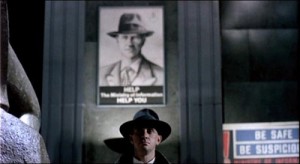Rich Reflection on Gardner Campbell’s youtube video, No Digital Facelifts: Thinking the Unthinkable About Open Educational Experiences
This video continued Campbell’s thoughts on creating personal cyberinfrastructure. I found it quite inspirational.
Digital facelift is a term coined by Clay Shirky in his blogpost Newspapers and Thinking the Unthinkable. Basically it means that when teaching, we’ll just do what we did before in the classroom, but we’ll put it on the web. Campbell used photo clips from the movie, Brazil to make his point that the one receiving the facelift can be convinced at what a wonderful thing it is, although it is ridiculous and not beneficial at all! I highly recommend seeing the movie Brazil, if you haven’t already. it was introduced to me a few years ago by a friend who felt he was living the life of the main character. The point is that just because the groupthink is pushing to do things a certain way, does not mean it is the best way or that it even makes sense.
Campbell also used the example of LittleBigPlanet, a Sony Playstation2 game, that includes authoring tools to the extent that users are allowed to become ‘producerly.’ The digital literacy components included along with how engaged the user becomes are just what we’d like to include in education.
 Instead of a digital facelift, Campbell detailed three recursive practices to include in our courses, and posited that they create confidence, rather than suspicion:
Instead of a digital facelift, Campbell detailed three recursive practices to include in our courses, and posited that they create confidence, rather than suspicion:
- Narrating (such as blogging)
- Curating – how you take care of your stuff and arrange it for others to see and for yourself. Students may believe they have nothing or will have nothing to curate, but he’d “like students to think that they begin their life’s work when they come to school.”
- Sharing – put your work out there; you may find the unmet friend. According to John Mott, “Meaning happens when the two people connect.”
In regard to the three recursive practices, Campbell says, “Much of the way education is set up militates against each of these, let alone all of them together. And yet we all know that one of the great things about the technologies we use, these information and communication technologies, is that they not only allow these things, they amplify them. They augment them. They turn them up to 11. They make that feedback happen.”
Campbell presented that every student should be an administrator of their digital life–a system administrator. The openness of work has three levels:
- Open to the world–everyone can see it.
- Open to each other
- Teacher open to learner, learners open to each other
- To know as we are know requires identity markers, a non-trivial factor
- Open to ourselves
- Self-awareness, metacognition
Campbell discussed that the invention of the printing press disrupted the world, but that personal cyberinfrastructure is a greater change, more akin to the advent of the alphabet.
Campbell showed a graphic of the Blackboard disucssion board interface and then compared it with the phpbb install from Cpanel, in which the user can have their own avatar, username, signature file–a personal identity. I thought he meant this was a php install to the Blackboard discussion control panel, but found that it is an install to your own web site. I found some plugins for WordPress as well. bbPress looks like a promising alternative for creating a forum.
Elearning support staff created a business math blog for Tim Stickel and I to use for our classes. When I examined it, it does not appear to use a plugin for the forum. Instead, a page was made for each topic, and students reply to that. Surprisingly, the current site looks very different than when we used it. As I recall, we needed help in the past when it would periodically rearrange itself (wordpress updates?) Because our blog is part of the UAF eLearning community, I’m not sure how to set that up myself at their location, but could easily work with eLearning support to do so. I wonder about the pros and cons of using the uaf community.
Campbell discussed the resistance of educators to change their teaching approach and the time to learn how to do it. He described that he was offering a bag of gold–who would not want to take that? I found his points very persuasive. It is obvious that so much of Campbell’s vision is incorporated into our own ED F654 class.
Campbell also spoke of the importance of getting the entire faculty in agreement to create their own personal cyberinfrastructure and then to teach the process to students and incorporate it as a part of every course. This makes perfect sense to me. With our class I am learning how to create personal cyberinfrastructure. Although I am just one teacher, I feel the need to begin somewhere, even if it’s just a module in a course. I don’t feel like I know enough exactly how to do this, but our class is a step in the right direction. He convinced me.
After completing this reflection, I created this meme.